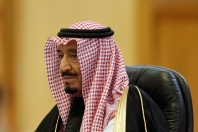Princely Personalities Sidelined in Saudi Arabia
Simon Henderson/Washington Institute
January 30, 2015
The latest shakeup among Saudi decisionmakers will require Washington to work on new relationships in Riyadh and perhaps reconfirm understandings reached at Tuesday’s summit.
Just two days after President Obama’s visit to Riyadh, King Salman has sacked several of the princes who met with the U.S. delegation. According to U.S. and Saudi reporting of the January 27 summit, talks between the two leaders were dominated by national security topics, including Iran, the “Islamic State”/ISIS, and Yemen. It is therefore surprising that the most senior departure is Prince Khaled bin Bandar, the head of Saudi intelligence, who sat near the king during the discussion. Although Khaled has been retained as an “advisor” to the king, this is usually thought of as an irrelevant position. He has been replaced by Khaled bin Ali bin Abdullah al-Humaidan, a nonroyal former general who was already a senior intelligence official.
Also out is Prince Bandar bin Sultan, the secretary-general of the Saudi National Security Council, former ambassador to Washington, and former intelligence chief who was viewed as one of the late King Abdullah’s closest confidants. The NSC has now been abolished, along with the Supreme Petroleum Council and other top advisory bodies. Another casualty is King Abdullah’s son Prince Turki, the sacked governor of Riyadh province who had greeted President Obama at the airport and bid him farewell upon his departure. Prince Mansour bin Mitab bin Abdulaziz — the minister of municipalities and rural affairs who was in the welcoming line for the president — was also demoted to “advisor,” even though Salman had confirmed all current cabinet members only a week before. Mansour and his father before him had run the ministry for thirty-five years.
Meanwhile, other princes were promoted, including deputy crown prince and interior minister Muhammad bin Nayef (a.k.a. MbN) and head of the royal court and defense minister Prince Muhammad bin Salman (MbS), son to the king. They were named the presidents of two new councils that will apparently serve as umbrella decisionmaking bodies: the Council of Political and Security Affairs and the Council of Economic and Development Affairs, respectively.
Perhaps significantly, MbN is not a member of MbS’s new council, but MbS is a member of MbN’s. Also promoted, at least incrementally, was another son of the king, Prince Abdulaziz bin Salman, who rose to deputy oil minister after long serving as assistant oil minister. Seventy-nine-year-old oil minister Ali Naimi remains in his post, as does Foreign Minister Prince Saud al-Faisal, forty years in the job and currently recovering from back surgery. Prince Mitab bin Abdullah, the late king’s most senior son, holds onto the Saudi Arabian National Guard.
Given King Salman’s exhausting schedule in recent weeks, he was likely unaware of all of the details behind the thirty-four royal decrees published late last night, some of which were probably formulated before King Abdullah passed away. Responsibility for some of those details likely lies with MbS, who though only in his early thirties has achieved a reputation as a sharp bureaucratic operator. Last year he was credited with the sacking of Prince Khaled bin Bandar as deputy defense minister after only six weeks in the job. The latest changes come less than two months after King Abdullah sacked six ministers, a decision announced within hours of a cabinet meeting chaired by then Crown Prince Salman. At the time, it was far from clear that Salman had been notified in advance of the king’s decision.
Another notable aspect of the announcements is that Crown Prince Muqrin is without his own ministerial portfolio, unlike his recent predecessors; this may limit his power base. In addition, the new heads of the Justice Ministry and religious police are considered less reform-minded than their predecessors. Some of the decrees also stipulate a two months’ salary bonus for government employees and retirees, despite some expectations that government spending will need to be reduced because of falling oil revenues.
For Washington, the changes mean that relationships with the new key personalities will need to be worked on, and that understandings developed during Tuesday’s summit may need to be reconfirmed. The succession has been described by many commentators as “smooth,” but any implication of continuity is probably misplaced.
**Simon Henderson is the Baker Fellow and director of the Gulf and Energy Policy Program at The Washington Institute, and author of the 2009 Policy Focus After King Abdullah: Succession in Saudi Arabia.























